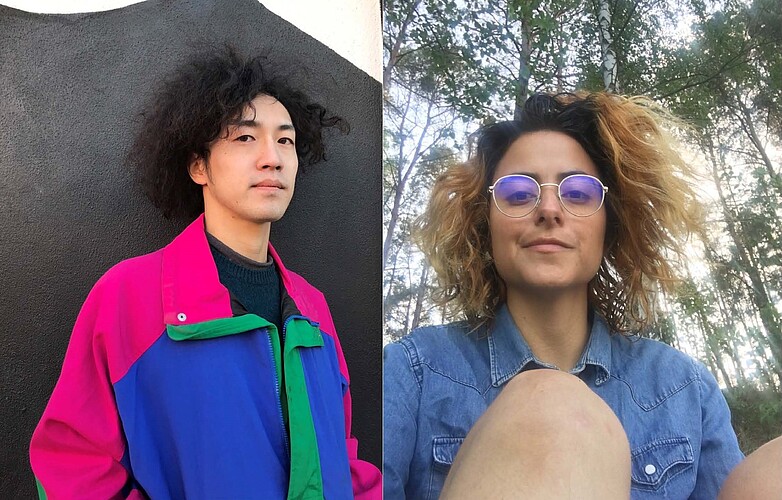Alex Viteri & Shuntaro Yoshida
Einen anderen Garten - die Recherche (AT) is part of an extensive inquiry where we research, document, and analyze practices within dance that train awareness of the environment. We’re drawn to art forms that offer a sensuous encounter with scientific knowledge and non-scientific data from various ecologies. We want to trace an affective map that considers the connections among these many practices, tracing down how these exist as a school of thought.
Our research proposal builds upon a continuing collaboration with choreographers, visual artists, scientists, and scholars working at the intersection of improvisational dance and ecocritical thinking. We are part of the happily forever growing group of artists engaged in understanding the agency of the nonhuman. One of our main driving forces is to merge our academic findings with embodied research. In 2020, we formed a dance collective: Mapped to the Closest Address. In particular, the Berlin Centre for Advanced Studies in Arts and Sciences (BAS) will support our collective’s artistic and theoretical research on choreographies among organic matters. Our proposal also responds to a larger quest to combine choreographic practices with community engagement and environmental concerns. We wish to connect with scholars, environmental activists, and plant specialists to reflect on our practice and trigger new aesthetics for our work.
MaCA’s work is rooted in collaboration with living beings and organic matters—most often cats, plants, and bodies of water. Over the past two years, we've also met and collected stories from fellow gardeners, tree doctors, community garden members, farmers and viticulturists, friends, and family. Our newest project, Turn Off the House lights, proposes gathering around a bonfire to watch the sunset. In the first iteration, we shared and anchored through sound waves with guests amid Tokyo’s midnight. Inspired by audio descriptions of performance events, we created an audio performance that weaves Tokyo’s landscapes with the 19th-century painter Frederic Church’s portrait of the Andean Mountain Chain. The work challenges colonial interpretations of the land and diverges into the psychic life of the mountains. Our guests in Berlin were handed wireless headphones and guided from the studio to the garden for a collective walk in an imagined forest. The online audience was asked to listen to our transmission next to a window and guided to venture outside. In our previous work, we explored low-tech tools, spy cams, and fax machines and accumulated several images, videos, sounds, and echoes of urban ecologies. For example, we turned to the video documentation of Violeta, a one-year-old cat, on his daily walks through a community garden in Germany. Similarly, we recorded with analog and digital tools the depths of a dying lake, the Helenesee in Frankfurt Oder. Our collective also takes care of a garden in Oder. Our time preparing the earth and mixing the compost pile informs our future dance/installations.
Alex Viteri is a South American performer and scholar based in Berlin. These days, working mostly at the threshold of the visual arts and performance. Viteri grew up in the Andes, alongside the mountains Ruco Pichincha and Cotopaxi. Inspired by feminist decolonial activists and scholars, her research cares for Andean modes of knowledge and the sharing of brown affects.
Shuntaro Yoshida is a dancer, choreographer, and researcher of contemporary dance and performance. He obtained a Ph.D. from Tokyo University of the Arts in 2020. Since completing his Ph.D., he has been a Visiting Scholar at the Department of Performing Arts at Berlin University of the Arts (UdK) and a Post-Doctoral Fellow at SenseLab at Concordia University. He conducts practice-based research in areas such as participatory choreographic practice, AI choreography, other species’ choreography, and environmental dance. Recently, he participates in the interspecies collective “Mapped to the Closest Address” and the Asian artist collective “Chōri dance.” Since 2022, he has served as Co-Editors-in-Chief at the Tokyo Academic Review of Books.
